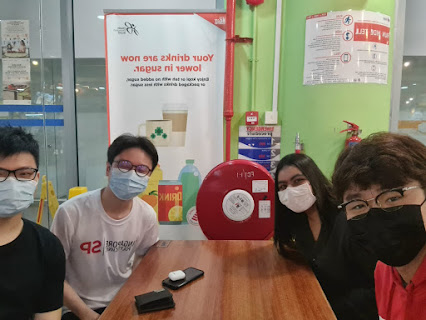FINAL PRESENTATION - week 17
So this will be the last tutorial session 😭😭for this module and we will be presenting on our final chemical product 📐🔧🔨📦and showing the class our prototype💥💪👷.
We went ahead and presented 👄to the class👯 about the idea 💡💡and here are our deck of slides💣💫🙌🌈 (found in the link below!):
https://drive.google.com/file/d/1qhtVsv4fVuPqVtugmEQR9Jm1mVJDKuq_/view?usp=sharing
----------------------------------------------------------------------------------------------------------------------------
📌Feedback we got from our peers and Dr Noel:
🙆What can be improved:🙆
- Should include slide number so that if audience would like to refer to a certain aspect of the presentation for queries/clarification its easier can just remember slide number.
The words must be aligned properly i.e. should standardize the font size so that the word is displayed as one "Demonstration" instead of "Demonstratio
n"
Size of Prototype because our group's goal is to enable the product to be user-friendly to solve our problem statement "how to heat up food on the go" currently our prototype is too large and bulky so in terms of portability its not very user-friendly but as it is an initial prototype, in subsequent tries, we will revise the design dimensions and specifications to make it smaller for increased portability
- For hand drawn sketches, it seems messy so when we use hand-drawn sketches, we need to make it presentable i.e. use different colours for the various arrows to direct attention to a certain aspect of the sketch
- ** We need to revise our design specifications of the product i.e. : As our product's operating principle is heat transfer, we want the heat to be transferred to one direction only i.e. upwards to the food (moreover, heat transfer is only possible when there is temperature difference) -> so how to transfer/direct the heat to just one direction i.e. upwards and make it stay there instead of continuously escaping out of the product or heat the sides of the container which is not useful as the site of heating is the base of the metal container i.e. upwards from the source of heat. So -> we need to include/specify inside our specification table the different parts/materials of the prototype so that we are aware which parts are made from insulators to prevent heat from being transferred to unnecessary parts of the product
- Similarly, our Water resistant/ Heat insulating specification in the design specification table is not applicable for all parts of the prototype so we have to make this specification specific/applicable to only the part of the prototype that requires the specification due to the position/operation/function of that part.
At some points words are too blurry and wordy on our slides so we need to improve on this
😁🙌What we did well:😁🙌
- Started off with a bang -> Jerome was very enthusiastic and used unusual pictures in his slides to captivate the audience's attention while conveying the message across.
- The use of arrows, animations on sketches/images were effective in directing attention of the audience to the aspects of the product when the presenters were explaining about the prototyping/mechanism design using images/sketches.
- The concise headings on the slides were effective in telling the audience what to expect from the presenter's explanation of the slide i.e. got the point across concisely
- The prototyping was done well with good effort in terms of documenting the process on the slides, gave the audience a good overview of the types of joineries used, how we did it etc by making use of what we learnt from our previous ICPD lessons in practicals 3 and 4.
- Good Lit review done in terms of temperature requirements of the product.
AND THAT IS THE END OF THIS MODULE 🙀😁😭💥💔🌈! On behalf of the group, we thoroughly enjoyed 😁🙌this module and it was an enriching 🧠, eye-opening👀 and fun😃😎😆💥 module for us! We would definitely enjoy ourselves all the way up to our capstone project and we cant wait for what's in store for us ahead🌈!

Comments
Post a Comment